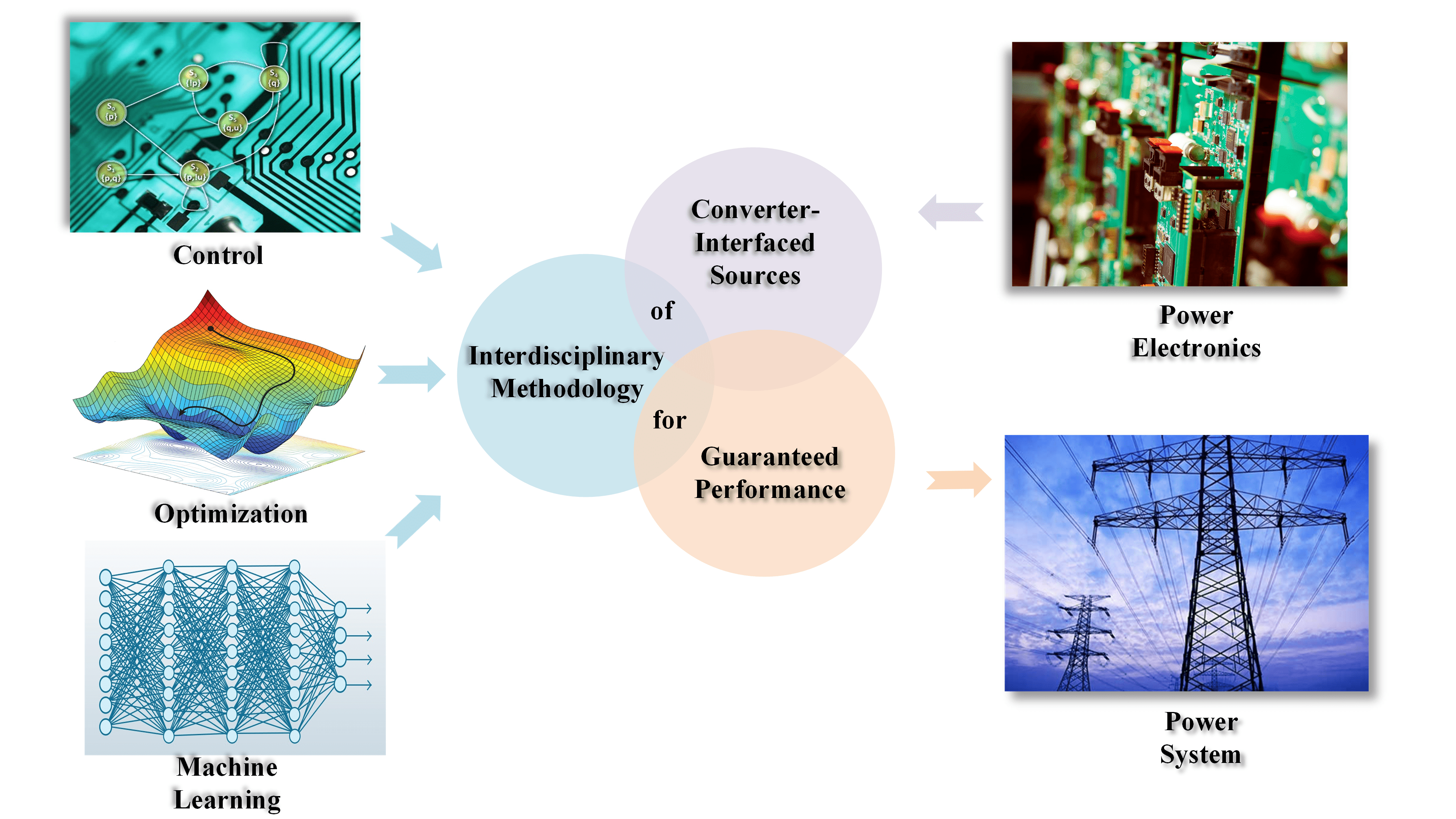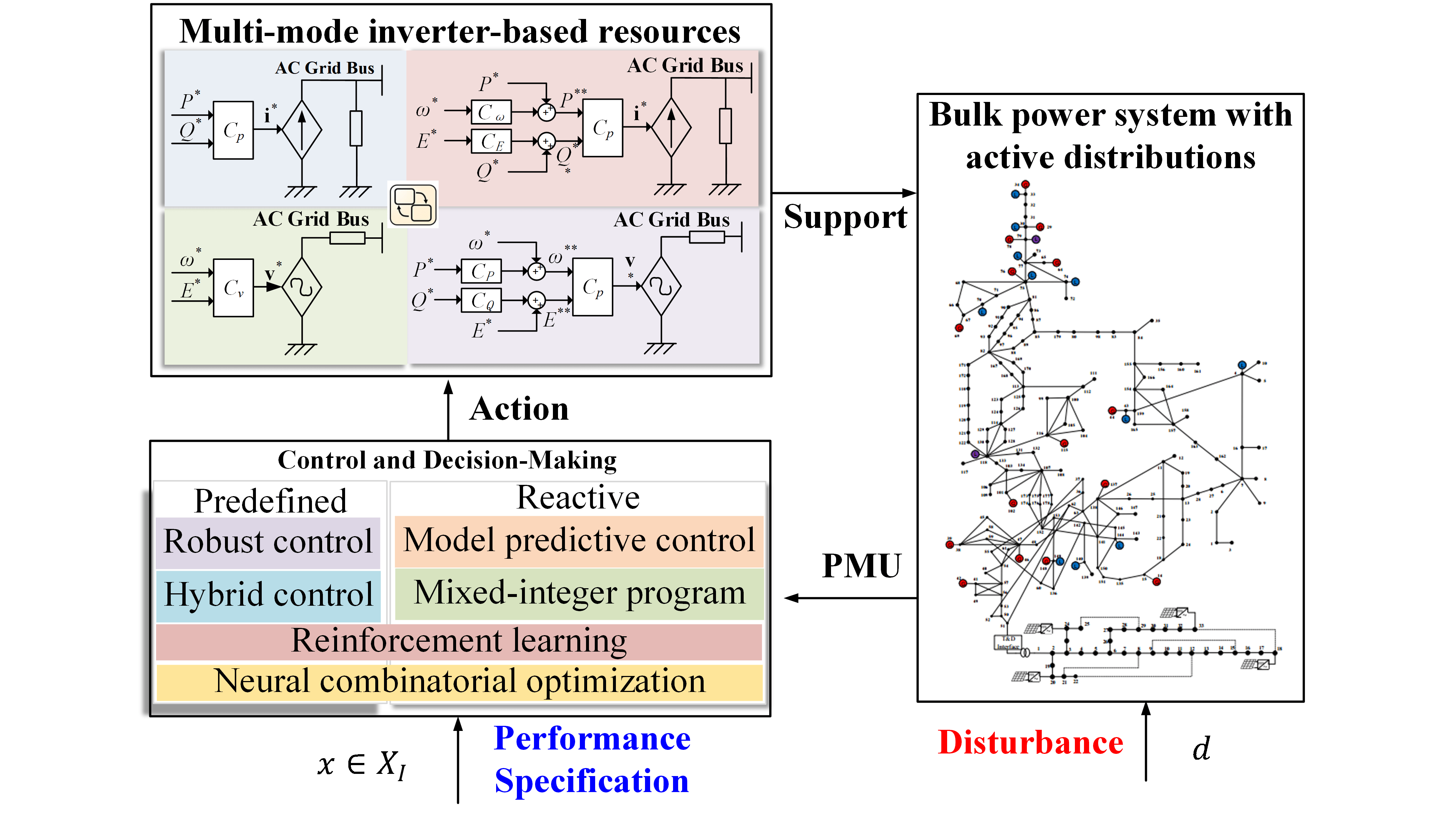Welcome
Welcome to the Power System Control and REnewable IntEgratioN (PSCREEN) lab. The PSCREEN lab is directed by Dr. Yichen Zhang, Assistant Professor of the Department of Electrical Engineering, College of Engineering, The University of Texas at Arlington, and empowered by our students, postdocs, and all our lab supporters.
At the PSCREEN, we draw on the diverse methods from optimal control, machine learning, formal methods, control and system theories to aid in the decision making of cyber-physical power systems, with particular interest on power systems with large-scale inverter-based resources. Particularly, we are interested in:
- Power system dynamics and control, renewable integration, wind turbines, frequency regulation of low-inertia grid
- Microgrid control, voltage-source converter, grid-interactive and grid-forming converters
- Formal verification, reachability analysis, hybrid systems, and their application in power systems
- Optimal control, robust control, numerical optimal control, reinforcement learning, and their application in power systems
- Surrogate optimization, machine learning for combinatorics, and their application in power systems
- Embeddable and distributed decision-making algorithms, control-in-the-loop real-time simulation for power systems
Here are some digital media about our research:
- A novel machine learning work for trajectory constrained optimization at Argonne
- A control paradigm for renewable integration at UTK
Recent News
- [01/2024] Mr. Qiang Liu has joined our lab. Welcome!
- [01/2024] Our paper “Virtual power plants for grid resilience: a concise overview of research and applications” has been accepted by IEEE/CAA Journal of Automatica Sinica.
- [12/2023] Our lab member Ms. Satakshi Singh has successfully graduated and will join EEPLUS, INC.
- [09/2023] Dr. Zhang will serve as the chair for session “Learning-Enabled Resilience for a Decarbonized Power Grid” at INFORMS Annual Meeting, Phoenix, AZ, USA, Oct. 15–19, 2023.
- [08/2023] Dr. Zhang started his service as the Vice-Chair, Customer Systems & Smart Buildings Subcommittee, IEEE PES Smart Buildings-Loads-Customer Systems Committee.
- [05/2023] Our paper “Situation-aware load restoration considering uncertainty and correlation” has been accepted by IEEE Trans. Power Syst.
- [05/2023] Our paper “Data-driven modeling of microgrid transient dynamics through modularized sparse identification” has been accepted by IEEE Trans. Smart Grid.
- [02/2023] My Ph.D. advisor Dr. Kevin Tomsovic is elected to the National Academy of Engineering (NAE).
- [01/2023] Dr. Zhang started his service as the Secretary, Customer Systems & Smart Buildings Subcommittee, IEEE PES Smart Buildings-Loads-Customer Systems Committee.
- [01/2023] Dr. Zhang started his service as the Webmaster for the Computing and Analytic Methods Subcommittee (CAMS), IEEE PES Analytic Methods for Power Systems (AMPS) Committee.
- [01/2023] Dr. Zhang started his service as the Associate Editor for IEEE Transactions on Power Systems and IEEE Power Engineering Letters.
- [12/2022] Dr. Zhang served as the Guest Editor for Frontiers in Energy Research Special Issue on New Paths Towards Carbon-Neutral Future Energy Systems: Planning, Operation and Market Design. More information can be found HERE.
- [12/2022] Dr. Zhang served as the Co-Chair of the Task Force “Reinforcement Learning and Machine Learning for Power System Dynamic Controls” under the IEEE WG “Machine Learning for Power Systems (MLPS)” and Technologies and Innovation Subcommittee.
- [12/2022] Our paper “Distributed data-driven optimization for voltage regulation in distribution systems” has been accepted by IEEE Trans. Power Systems.
- [12/2022] Our paper “Power system restoration with renewable participation” has been accepted by IEEE Trans. Sustainable Energy.
- [12/2022] Our paper “Robust trajectory-constrained frequency control for microgrids considering model linearization error” has been accepted by Applied Energy.
- [10/2022] Dr. Zhang served as the Session Chair for Panel “Learning to Solve Optimization and Control Problems in Power Systems” at INFORMS Annual Meeting in Indianapolis, and Panelist for presentation “Safety and Stability in AI-Based Dynamic Control Design for Inverter-Dominant Power Systems.”
- [07/2022] Dr. Zhang served as the Co-Chair for Super Panel “Cyber Secure Grid-Interactive Efficient Buildings to Enhance Power System Flexibility and Resilience” at IEEE PES General Meeting in Denver.
- [07/2022] Dr. Zhang served as the Panelist of Performance Evaluation Metrics of AI and Traditional Approaches for Power Systems at IEEE PES General Meeting, and presented “Ensuring Stability in AI-Based Dynamic Control Design for Power Systems.”
- [07/2022] Dr. Zhang’s co-authored paper “Andes-gym: a versatile environment for deep reinforcement learning in power systems” received the Best Paper Award of 2022 IEEE PES General Meeting. [Open-source Toolkit: Andes-gym]
- [07/2022] Dr. Zhang has four conference papers accepted by IEEE PES General Meeting at Denver.
- [06/2022] Our paper “Power electronics-enabled cyber-physical power systems: a review on modeling, simulation, and cybersecurity” by WIRE Energy and Environment.
- [05/2022] Dr. Zhang served as the Co-Lead Guest Editor for IET Renewable Power Generation Special Issue on Operational and Structural Resilience of Power Grids with High Penetration of Renewables. More information can be found HERE.
- [04/2022] Dr. Zhang served as the Session Co-chair for Panel “Grid-interactive Efficient Buildings to Enhance Power Grid Flexibility and Resilience” at IEEE PES Transmission & Distribution Conference & Exposition in New Orleans and Panelist for presentation “A Novel Hierarchical Frequency-Based Load Control Architecture.”
- [04/2022] Dr. Zhang served as the Session Chair for Panel “Data Analytics and Machine Learning for Power System Monitoring and Operation: An Industrial Perspective” at IEEE PES Innovative Smart Grid Technologies Conference, New Orleans.
- [04/2022] Our paper “Ensuring transient stability with guaranteed region of attraction in DC microgrids” has been accepted by IEEE Trans. Power Syst..
- [04/2022] Our paper “Deep active learning for solvability prediction in power systems” has been accepted by Mod. Power Syst. Clean Energy.
More NEWS here


